MOVIE REVIEWS |
INTERVIEWS |
YOUTUBE |
NEWS
|
EDITORIALS | EVENTS |
AUDIO |
ESSAYS |
ARCHIVES |
CONTACT
|
PHOTOS |
COMING SOON|
EXAMINER.COM FILM ARTICLES
||HOME

Friday, January 24, 2014
ESSAY The Wolf Of
Wall Street
Now Playing Forever: The Enablers, Starring You & Me
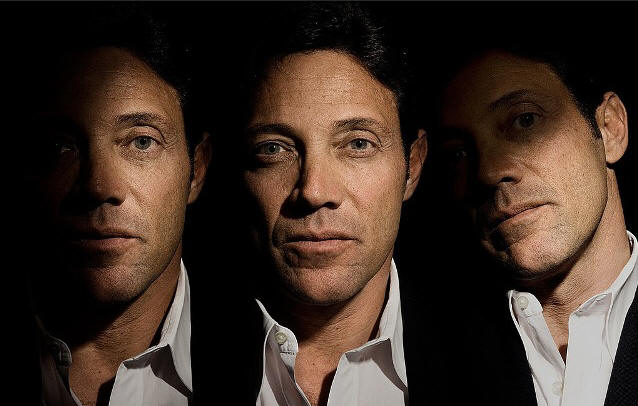
Jordan Belfort.
Tom Sanders
by
Omar P.L. Moore/PopcornReel.com
 FOLLOW
FOLLOW
Friday,
January 24,
2014
"It is what it is", the overused saying goes. And in
"The Wolf Of Wall Street" it is all about us. The audience in the film,
and we, the audience watching it, are keys to the film.
Martin Scorsese's comedy-drama is squarely about the time we live in now and
since humankind began: greed, avarice and selfishness. No newsflash, but
it's how we've got this far, or at least how we've survived. It's how many
of us get to the top. It's always been about us, more than it has ever
been about Ivan Boesky, Charles Keating, Jeffrey Skilling, Michael Milken,
Kenneth Lay or Bernie Madoff, to name a few. We -- or the media -- give
these criminals colorful or colloquial names, thereby glorifying and affirming
their favored or admired status in popular culture. It's our blatant
approval. In return very few of them even get to go to country club
prisons much less jail.
We love a scandal and a scammer -- so long as we're not the ones being scammed.
"Money . . . makes you a better person," insists Jordan Belfort
(Leonardo DiCaprio) in "The Wolf Of Wall Street", Mr. Scorsese's wild,
orgiastic masterwork of salesmanship and con. Each assertion made by Belfort
renders him a most unreliable narrator. Belfort, a sociopath on the order
of Patrick Bateman sans murders, is as obsessed with money, drugs and sex as his iconic 1980s
cousin is with business cards and killing. Belfort is annoyed he made less
than a million dollars a week in his first year as a stockbroker pushing his hard sell of weak stocks on
the
poor, rich and old. Does money make you a better person?
Jordan Belfort cheats on his wives with prostitutes from across the economic spectrum.
He cheats his clients, who read The Wall Street Journal too late to
realize that their stock is worthless and their thousands of dollars are in Belfort's pockets.
"I know how to spend it better," Belfort boasts. Ill-advised purchases will ensue.
We watch and cheerlead silently or with a belly laugh. Schadenfreude is
fully engaged.
"The
Wolf Of Wall Street" is an epic cartoon reel of debauchery, sex and sin.
Its absurd romp of excess has disturbing power in one early scene.
It is the early 1990s. An employee at Belfort's self-made firm Stratton Oakmont gets her head shaved for $10,000 on the firm's trading floor. "SHE'S
ALREADY A C-CUP BUT SHE WANTS DOUBLE-D'S!", Belfort shouts. As the
secretary's locks
are shorn you may think of a Jewish woman being shaved before being marched to the
gas chamber in the 1930s or '40s. This particular woman, however, is counting
her ten grand and looks as if she's experiencing an orgasm.
Everyone has a price. What's yours?, Scorsese asks us in this
consumerist culture, in this age where America no longer produces anything.
("We don't create anything," says Matthew McConaughey's Mark Hanna, an initiator
of vice city manhood to Belfort.)
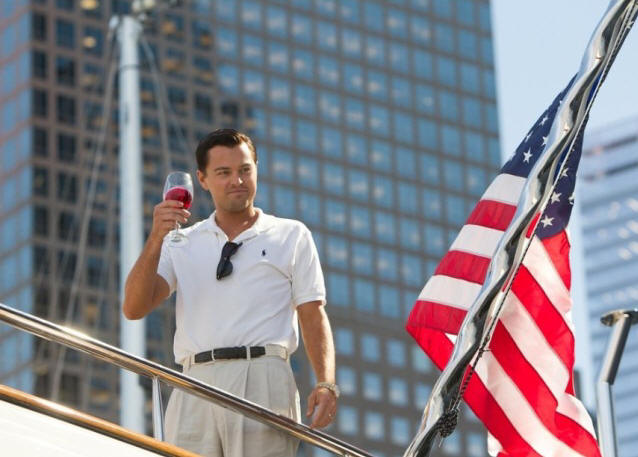
Leonardo DiCaprio as Jordan Belfort in "The Wolf Of Wall Street".
Paramount Pictures
Howlin' Wolf's classic
"Smokestack Lightning" plays to haunting,
hallucinogenic effect in the chaotic head-shaving scene. Before then
"Stars And Stripes Forever" has played awkwardly as a satirical overlay,
accompanied by the great American pre-game entertainment: band-marching Stratton
employees, followed by scores of cheerleaders, then near-naked
strippers and hookers who rudely invade, hurtling through the
frame from both sides on an unsettling collision course.
The whole scene, like many others, is creepy, calculated overkill. In it
women are groped, wrestling and writhing on the ground with and in the arms of
male Strattonites. It may or may not be the opposite of the
Tailhook
Terror, which occurred at the same time Belfort's escapades did.
The grotesque scene in "The Wolf Of Wall Street" recalls the misogyny
notoriously rife
on many trading floors. I worked on one in New York City for several years at the time Mr.
Belfort did. I saw and heard too much. One woman who traded on the
floor with the six men wouldn't stand for it. Another woman simply played
along and smiled as the male banter about women and anatomy ratcheted up.
(And me? I simply kept on working. Enabling.)
Howlin' Wolf's song competes with "Stars", fighting for
volume supremacy on the film's soundtrack, the way Ruben Blades and Public
Enemy did on beat-boxes in "Do The Right Thing". It's a shrewd duel between Blues music and the patriotic tones of "Stars And Stripes", a
very fight for the soul of sanity and reason both in the scene and the larger
metaphorical American conscience. "Oh, don't you hear me crying," Mr. Wolf
croons on "Smokestack" as chaos reigns. It's as if he's crying out in the
pain an African-American Bluesman knows, crying out for morality, peace and
justice as decadence cascades from the heavens like poisoned confetti. Mr.
Wolf's
voice is
the last voice of true patriotism, as the subverted American Dream has
reasserted itself robustly as new old cultural language.
Entrenched, Historical Roots
The deeper, more powerful subtext of the anarchy and avarice here however, is slavery, and Wall Street's
prominent role in it.
This is also caught in a line in another scene where the firm's legal mind (P.J.
Byrne) advises about the ethics of midget-tossing in the office: "If we don't view them as human
but consider it an act...". The allusion is irresistible both as
self-justification and the perverse ways to self-entertain in a hunter's death
culture Duck Dynasty environment, where no one creates anything. The
midget-tossing is a descendant of America's historical dehumanization of black
people. Whether the activity is midgets tossed for "fun" or blacks lynched
from the highest tree, both have captive audiences. Some of those
audiences included small children, getting their first look at death up close.
Mr. Scorsese avoids focusing on those who lost money. It would be too easy
a let-off for Jordan Belfort and us if images of those hurt were introduced,
substituting our judgment for theirs. Such would put a filmgoing audience on
auto-pilot. Like some documentaries and investigative news stories, a
reappearance of the aggrieved may serve to exploit them further.
Thankfully, Mr. Scorsese provokes us to think. If, in
the late 1980s and early 1990s, Jordan Belfort, a 20-something nobody, could get rich overnight by
victimizing countless thousands of over $200 million, why should anyone be
surprised about the manner in which J.P.
Morgan, the Mellons, Rothschilds, Lehmans and Merrill Lynches of the world came
to their wealth?
The point, in part, is that "others" -- literal and figurative -- pay severely
for a lifestyle that the rich lead, and it's a lifestyle often marked in blood.
The business of slavery and commoditization of black people (the original
stocks) in "12 Years A Slave" can be inextricably linked to the pathologies and
ill-gotten gains of the characters in "The Wolf Of Wall Street". We sit
stone-faced at one film and laugh hysterically with the other. Yet they
are two sides of the same coin.

Lynch mob,
1993: Leonardo DiCaprio and Ethan Suplee in Martin Scorsese's "The Wolf Of
Wall Street".
Paramount Pictures
Contradictions And Advertising
In Mr. Scorsese's film Howlin' Wolf's "Smokestack" will be heard again
over an orgy sequence and a Las Vegas scene where $2 million worth of damage in
one weekend from an orgy and other drugged-out, drunken exploits,
is paid for by Belfort, who has
the audacity to later call a colleague an "irresponsible little prick".
(I couldn't help but think of Joe Pesci's Nicky Santoro in "Casino" saying to
another character that he is a "degenerate" for gambling while his wife and kids
are at home, while Santoro kills people while his wife and
child are at home.) The level of self-denial and loathing is deep.
Still, Mr. Scorsese isn't judging his characters. In "The Wolf Of Wall
Street" he's judging the metaphorical rich to a degree, at least in
as much as depicting the craving of the material and excess that has permeated
our societies and magazines from day one.
In the film Mr. Scorsese cynically showcases the Lie In Advertising and its
indispensible accessories: a slick product plus a
smooth, dynamic talker to send people over the edge of a cliff, cashless.
(The clients Jordan lies to over the phone rely on his voice, just like the
fast-food workers in "Compliance".) Various TV commercials are
shown in "The Wolf Of Wall Street", each a lie in its own right. One
character mocks his own company ads in Hustler and Popular Mechanics.
He's smart enough not to believe his own hype or headlines.
The commercial that opens
"The Wolf Of Wall Street" is the biggest lie of all, blatantly modeled after a
Dreyfus TV commercial from the early 1990s.
Later, an infomercial tantamount to
the "Morrie's Wigs Don't Come Off" ad in "GoodFellas" is rudely interrupted.
Each scene in "The Wolf Of Wall Street" is almost always contradicted
in midstream or by the scene
directly following it, either as lampooning rebuke or cruel indictment.
The scenes are like trump cards from a stacked deck of contradictions, ironies
and conundrums.
The Church Of More
As entertaining, brilliant and troubling as "The Wolf Of Wall Street" is, the entire film is a seductive con -- on us
as moviegoers. It's a three-hour commercial or trailer, wicked sales
trick-as-Rorschach test. And we've already paid our
ticket to be suckered and seduced by its criminal-in-chief. (Some more than once.) Cue the car, the sexy
woman in bed, the lingerie. Chanel, Gucci, Armani -- those badges of identity
and "status" adorning our necks, wrists, arms and feet -- the ones that say
loudly "we've made it" (when in actuality the designers of those brands have)
are prominently displayed during coke-filled orgies. Marks of decadence
and decay.
In "The Wolf Of Wall Street" the material splendor is externalized and
romanticized by the men but for the film's women the joy, pleasure and
affirmation material and opulence bring is implicit.
When Naomi (Margot Robbie) takes off her boots in one scene the camera takes
care to capture the two interlocking golden "G" for Gucci.
"Diamonds are a girl's best friend," the saying goes. Naomi and Teresa
(Belfort's first wife) may question
how Jordan got his money but Naomi in particular has no question about spending it, thereby enabling
her husband's crimes. Like Jasmine in
"Blue Jasmine" by looking the other way and enabling Naomi may be worse than
Belfort in some respects.
"You married me," she says. It's a revealing line. That it wisely
goes unexplained makes it more profound. The point however, has been
clearly made: Naomi is as much an opportunist as Jordan is.

The mantra of
"The Wolf Of
Wall Street".
Paramount Pictures
We want more.
And more is never enough. So what do you do at that point?
Gorge on more
drugs and banal, meaningless carnival sex, the latter of which cinematographer Rodrigo Prieto shoots mostly from
above, as if God himself is looking down disdainfully on this end of the world
banquet. Though many scenes are long and episodic, Mr. Scorsese
doesn't linger on nudity for too long. The sex is fleeting, not
erotic, which is the point. Some of the scenes look like the Roman Empire spinning out of
control, part of human civilization way off its axis. Nihilism Gone Wild.
The only misogyny in "Wolf" is Mr. Belfort's,
not the director's. Belfort's book outlines this conclusively. In it
he objectifies women every which way, and to nauseating, highly offensive
degrees. While Mr. Scorsese's women often
disrobe, the lead women in "Wolf" are assertive correctors and alarm bell
ringers, often literally beating their
inept "men" into shape. Both Jordan and Donnie are little boys whipped in
line by their wife-mothers, publicly and privately. It's one of the few times we laugh
at how lost and pathetic these men are.
As human beings we are supposed to be the stars of our own self-regulation but
all-too often
we are its villains. Our weaknesses override us. Especially when
power abets and corrupts absolutely. AIG runs
wild at retreats after
an $85 billion taxpayer bailout. The SEC,
which tracked Belfort for years,
has scandals of its own. The idea of
financial companies, especially after 2008, asking us to trust them is now
laughable. Yet we continue to do so. Billions and billions of dollars were stolen from people around the
globe. No one was jailed. So why are some of us more outraged at Martin
Scorsese for making "The Wolf Of Wall Street" than at the Goldman Sachses and Bernie Madoffs?
Finance is presented as dry and uninteresting while art is always a provoker of
the public conscience.
In Mr. Scorsese's film
Jordan Belfort is the pied populist of capitalism, exhorting, electrifying and persuading in long
speeches with primal shouts and guttural Cro-Magnon fervor. Pure
Darwinist. The Jim Jones of your financial fate. A televangelist of the
get-rich quick with-no-consequences school. Unlike Jimmy Swaggart he
never thinks he's sinned. Money acquisition justifies all, though the
heavens fall. Belfort penetrates his audience with the
fervent appeals of a Tony Robbins to "solve your problems by becoming rich."
Belfort is a criminal and an exploiter but what does that makes those who follow him and get reeled
in? Belfort is extremely smart and knows better, but his drug-fueled self-delusions
fuel his downward spiral.
Mr. Scorsese's men want to make names for themselves. They view themselves as
inflated movie stars in their own production. Their narration often sounds
excited or
awe-stricken. Belfort is a cult leader who relishes the
spotlight and power he has over people but is isolated and confined by self-inflation and gratuitous indulgence. Jordan Belfort is Rupert Pupkin
2.0, slicker, smoother, less lonely but more successful with women (though for
Belfort the sex is over far too fast.) He's morally poorer despite his riches.
"There's no nobility in being poor. I've been rich and I've been poor and
I choose rich every time!", Belfort tells his admiring mob of employees in one
impassioned speech. But being rich has nothing to do with morality or
integrity.
Lying With The Truth
Belfort's seeming self-confidence is offset by extremely low self-esteem.
As sheer showcase act he's today's Jerry
Springer of spectacle or the Maury Povich/Geraldo Rivera of public humiliation.
Belfort is yesterday's Elmer Gantry or Jack Nicholson
addressing union delegates in "Hoffa". He's Jonathan in "Carnal Knowledge"
squaring up to Ann-Margret but he's met his match in Naomi and H20.
"Aren't you glad you've got a husband who's in great shape like this?", Belfort
asks. Yet he's in anything but.
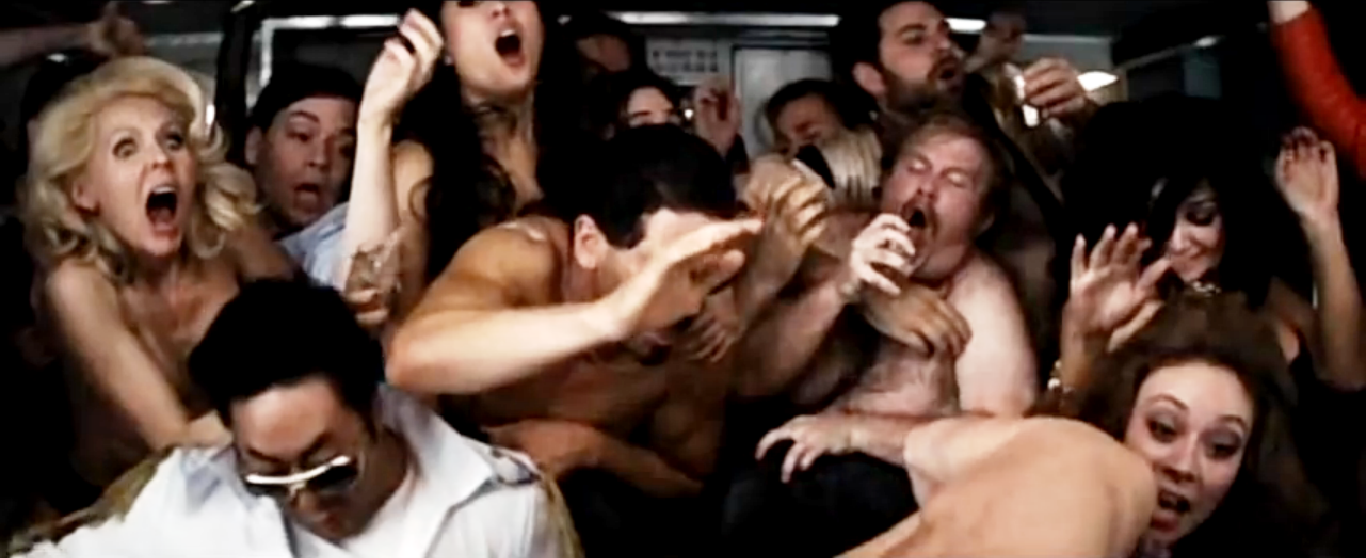
The Discreet
Charm Of The Degenerates: a screenshot from "The Wolf Of Wall Street".
Paramount Pictures
Leo DiCaprio is transfixing,
hilarious, mesmerizing and manipulative as Jordan Belfort. What may make
some audiences uncomfortable in "The Wolf Of Wall Street" is their love of Mr.
DiCaprio, previously a boyish Titanic guy who they now see onscreen as a handsome,
ruthless monster. (There are some scenes on the high seas in
"Wolf" that evoke "Titanic", though in a very different context.) We love
and identify with our movie stars no matter how rich they are. (We're
constantly told who the highest paid among them are.) Actors lie
to us all the time. That's what they are paid to do. They sell.
Sometimes convincingly. And every time, we buy -- even when we don't.
In life, virtually every human interaction is a buy and a sell.
Throughout "The Wolf Of Wall Street" Jordan Belfort lies to us pathologically, and in his
book, like Tony Montana he is unblinkingly honest. Even
when he lies, which is often, and to himself, he tells the truth in his own incredibly
human way. The line between the truth and the lie is incredibly thin.
One travels far faster than the other. In our pursuit of riches and
identification with movie stars we want to be lied to. And we are.
In the movies it's commonly known as "suspension of disbelief". We want to
believe that once we become rich, everything will be all right. We play a
hopeless lotto. We know we have no chance.
Tony
Montana excoriates the rich in "Scarface" in a subversive way.
"You need people like me," he says. Like the D.E.A. needs drug dealers.
The Tony Montana speech is the best and most honest thing about "Scarface".
Today that speech would be directed at the "Wolf" dissenters in the audience
who claim the film glorifies Belfort.
Jordan Belfort could have given that speech himself -- and in a way he does in
Mr. Scorsese's film when he says, "if you think I'm being materialistic, then go
get a job at McDonald's." (Those McDonald's burgers, by the way, never
look as good in reality as they do in the commercials.) Like Belfort,
Montana is also drunk on his own stardom and even more so on his own lie.
The lie has power, especially when we enable it.
For every film of its kind since "Wall Street", which opened just two
months after
the 1987 crash - "The Corporation", "Boiler Room", "Enron: The Smartest Guys In
The Room", "Inside Job", "Capitalism: A Love Story" and "Margin Call" - none has
shown the full-blooded id and decadence on screen like Mr. Scorsese's epic does.
The director's best film since "GoodFellas" unapologetically offers no
redeeming characters and a refreshing absence of moralizing. The
assignments are left to us as an audience to do. We are the fourth wall
that Belfort gleefully and
arrogantly
crashes through.
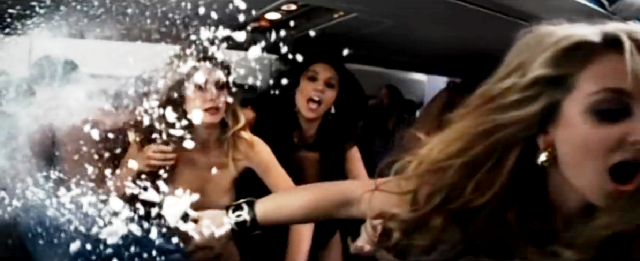
Coke Coke
Chanel: The Chanel logo on one woman's wrist as cocaine flies high.
Paramount Pictures
The Audience And Attraction
Is Jordan Belfort living the "high" life in fine style or is he living out
self-loathing and a self-destructive nightmare on a Groundhog Day basis? He
has cars and boats but they all end up destroyed. Do we envy him, love
him, or despise him? The truth is we want to be like Jordan Belfort, to have the
unbridled freedom to let our hair down and pull down our pants publicly without
apology. To not be accountable.
That is sexy to us, exciting, liberating, to unleash that inner beast,
that deeper, base part of ourselves. To be alive. To
breathe. ("But I gotta admit: it turned me on," Lorraine Bracco's character says of the gun her husband hands her in "Goodfellas".)
The notion of losing ourselves to reckless abandon is immensely appealing and powerful even as we gasp
in horror at Jordan Belfort's brutality to his wife in one scene. In
his book, on which Mr. Scorsese's film is based the scene is even worse: Belfort kicks his wife in her stomach on a
staircase and she tumbles down the stairs. (Their six year-old daughter
witnesses it all.)
Film romanticizes the warped
as much as the exalted, and Mr. Scorsese asks us to think about why we want
to be where Belfort is, even as he hits rock bottom in a death culture.
Throughout Mr. Scorsese's film we
live vicariously through Belfort and enable him to a degree by not leaving the
theater. We are sold and seduced by Belfort's speeches.
He talks directly to us when he says, "Is your landlord ready to evict you?
Good! Then pick up the phone and start dialing!" Mr. Scorsese has an
extreme close up of Mr. DiCaprio as he says this. "The Wolf Of Wall
Street" is loopy, disjointed enough to accurately capture the frenzy, mania and
delusion of Wall Street criminals, yet it is edited so well. Three hours
passes by quickly.
Jordan
Belfort never grows up. He's a Toys 'R Us kid, and he who dies with the
most toys wins, even if it's winning a lifetime in Hell. Cocaine and
Quaaludes are Belfort's adult pacifiers. In one madcap scene Belfort retrieves cocaine
from what looks like his toddler daughter's red plastic container.
It's a shocking and comically ironic moment. That he'd hide
cocaine there. It's not unlike Ms. Bracco's Karen Hill in "Goodfellas"
shoving a gun down her panties as the FBI raids her house. (The Jordan
Belfort-Donnie Azoff Quaalude wrestling slog is pure Preston Sturges and Three
Stooges. Animated theater Looney Tunes might envy.)
Mr. DiCaprio is excellent in "The Wolf Of Wall Street", giving the best performance
of his career. The actor's sly charm
offensive keeps us laughing with him as we feel the guilt Mr. Scorsese
normally allows the characters in his films to feel. It is our turn and
we fall into the trap. Again, for Jordan Belfort's crimes to occur
there must be a captive audience. It takes two to
tango. We are that audience. We always have been. Which is why the audience,
a constant character in Scorsese films ("King Of Comedy", "Casino", "Raging
Bull", "The Last Temptation Of Christ") is vitally important in "The Wolf
Of Wall Street".
Crowds (or is that lynch mobs on trading floors?) constantly occupy the frame.
The schemes of Bernie Madoff can't exist without a captive audience willing to
help them along or do its bidding, knowingly or otherwise. Neither could
the
horrific true-life crimes of "Compliance" exist without the enablers in
them. We, the audience, are sometimes a criminal's
greatest enablers in many respects.
Art like "The Wolf Of Wall Street" drives that scary truth home, as does the final scene in the
film, which asks: do we have the killer instinct to sell, to make money in
excess or for survival's sake, and which will endure longest, the self-regulation or
the excessiveness? Will that audience in Australia be the last line of
defense and overturn generations of the defect in the human condition
articulated in the book "The
Selfish Gene"? That Australian audience is us. The last scene is one of
nervousness, anxiety and purposeful open-endedness. Some in that audience fidget and feebly
attempt to sell a pen, of all things, and not a human being. How would we
do selling a pen on the spot?

The audience
in "The Wolf Of Wall Street".
Paramount Pictures
Looking In The Mirror
Above all else "The
Wolf Of Wall Street", a shallow film on its surface, is about us, our inherent greed, the American and worldwide
way of graft, and the global civilization's ongoing selfishness as
self-preservation and survival mechanism. "The Wolf Of Wall Street" in
part stands for the proposition that the more money you acquire the greater the
contempt and disdain you have not only for everyone but also for yourself.
Misogyny, abuse and self-destruction are amplified and naturally flow from power
and the hunger for more. "Look what I've got! A year's salary right
here! You know what these are? Fun coupons!" There's
self-contempt in Belfort's voice, as the FBI he's just taunted departs
his lavish boat as suddenly uninvited guests, and he
deals countless $100 bills into the wind at them as if they are playing cards.
He's fed up. Money is meaningless to Belfort.
So what in the world means anything to Jordan Belfort?
Quick glimpses of
the enabling factions around Belfort show us there's acknowledgment of moral
judgment. "Mad Max"
Belfort (Rob Reiner) notes how "obscene" Jordan's life is but approves of his son's adultery. Belfort's mother is non-existent and a
silent assenter. She barely speaks in the film, mute like Allison Janney's
character in "American Beauty".
Mr. Scorsese has always been interested in character complexity, in gangsters
and turf, whether in Tammany Hall or in 1970s New York. Now it's Wall
Street. He has mined attraction-repulsion, guilt, monetary
obsession, class tension and fragile, volatile men struggling to
find their manhood through violence or sex, or feeling a fear of not having any true manhood at all.
The fear in these men is
wrapped in a torrent of homophobia and ambiguity.
In "The Wolf Of Wall Street" Belfort and other men make references to "blowjobs" and "sucking people off". Donnie
insists he has no issue with gay people even as he spouts anti-gay epithets.
Strangely, the full n-word itself isn't uttered in any scene. The absence of
the word would have been unthinkable in 1993 among stockbrokers or anyone else, and even more
ridiculous and unrealistic today in light of Riley Cooper in 2013 and many
millions of others in 2014.
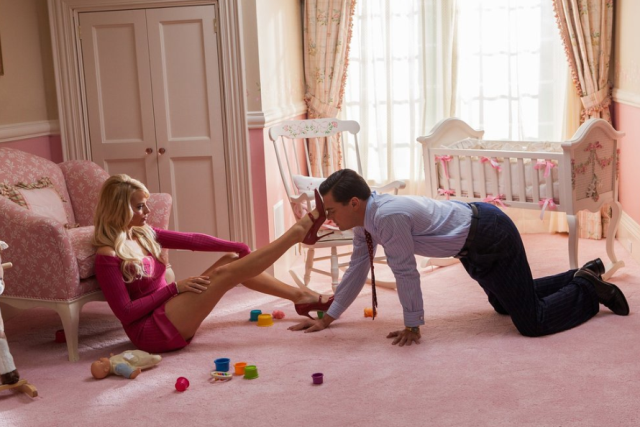
Margot Robbie
as Naomi and Leo DiCaprio as Jordan Belfort in "The Wolf Of Wall Street".
Paramount Pictures
Believing In Headlines
In Jordan Belfort Mr. Scorsese shows us a man wedded solely to money and
hedonistic largess
while disengaged and anesthetized from himself. "That's the normal world.
But who wanted to live there?", Belfort narrates. He's been seduced to the
point where his ill-gotten gains have allowed him to rationalize his corruption
of the American Dream and beat it at its own mirage. Belfort, whose
motley Gang Of New York "idiots" replace pickaxes with exposed fake penises (ala
Jack Nicholson in "The Departed") at
parties, curses a Forbes story on him. Later the story brings eager
youngsters begging to work with him. "There's no such thing as bad
publicity," his first wife advises.
Publicity and media are an obsession
to Scorsese men, typically outsiders in America, and serve as validation of their place
on the American landscape. They seek the limelight, have contentious
relationships with their own headlines or have their own TV shows (Ace Rothstein
in "Casino", Pupkin in "King Of Comedy".) They are the very romantics we
are, and in that way we have an affinity to them. They quote movies
("The Oklahoma Kid" in "GoodFellas", among others.) Or go
to them (in "Mean Streets".) In his book Jordan Belfort mentions "The
Godfather". Scorsese's men
love the movies, as do we. These men define themselves by them.
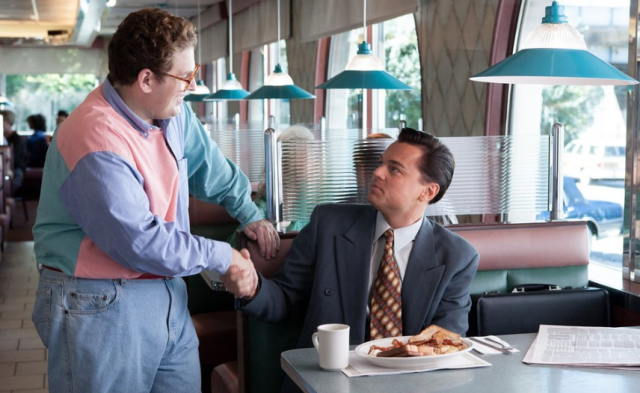
Jonah Hill as
Donnie Azoff and Leo DiCaprio as Jordan Belfort in "The Wolf Of Wall Street".
Paramount Pictures
Tribalism And Turf
Mr. Scorsese's films often exhibit a very intense tribalism between and among its
characters. The tribalism of Jordan Belfort is clear. He sees WASPS
and Wall Street as the enemy that gangsters do in "GoodFellas", a warmer, more
familial true-life film than this bright, energetic plastic fantasy brilliantly
edited by Thelma Schoonmaker. "Why don't you go down to Wall Street and
catch some real crooks?", asks an arrested mobster in Mr. Scorsese's landmark 1990 film. It's
a valid point, but it only serves as a weak inoculation from the truism that two
wrongs don't make a right.
Similarly, in the best scene in "The Wolf Of Wall Street" Jordan Belfort pleads the same
case, as he tells FBI Agent Denham (Kyle Chandler, great here) that if he wants to catch some criminals he should
look into what Merrill Lynch is doing with credit swaps and internet stocks.
Belfort, who is Jewish, is full of self-hatred of Jewish people in his tell-all
book, is arguably resentful of Wall Street as he competes so vigorously with it.
His Stratton Oakmont is located on Long Island in Lake S(ex)cess, if you will,
populated by a vastly white ethnic male group of working and middle-class pups
who have suddenly become millionaires.
Jordan
Belfort manipulates his employee audience. He baits and switches on the "rathole"
friends he claims to love. We see his friends' star-struck gullibility at
his own power to galvanize and convince. We see our own gullible ways.
When Belfort says, "I ain't going nowhere!" it's an unmistakable metaphor about
greed. Greed has been here as long as we have. It isn't
disappearing. Jordan Belfort is greed's latest incarnation, one that has
trampled and reduced Gordon Gekko to a GEICO commercial.
Gordon Gekko is now selling insurance, of all things.
And his accent has changed.
Jordan Belfort is bathed in his own mythology. When Belfort is seated in a
Swiss office the view of the huge ocean through the window behind him is also an
inflated
projection of his own subconscious and legend: vast, unbeatable, voracious, a
superpower. By contrast, Jean Dujardin, who plays a Swiss banker, has a
small fish tank behind him. He swims with the fishes. There's a
notable curiosity in Belfort as he cautiously walks toward the fish tank.
It's a subtle and interesting move both by the character and the filmmaker.
The tension between American and Swiss characters in "The Wolf Of Wall Street"
is noteworthy. The Swiss are seen as neutrals in geopolitical affairs but
paradoxically may be a tad resentful or envious of the influx of millions of
American dollars as an invading U.S. dumping ground on their soil. (A
prosecutor will later use the queasy analogy of Reagan's U.S. invasion of the
tiny country of Grenada to Jordan Belfort's predicament. As the prosecutor
hands Belfort a statement to sign, a photo of Bill Clinton hangs on the wall
behind him, circa 1996, two years before he becomes an alum of the Belfort
school of lies.)
Heroes
Some of the finest moments in "The Wolf Of Wall Street" -- the redundancy of
the film's sex, drugs and money are obviously intentional -- involve hero worship.
The Lemonheads'
edition of "Mrs. Robinson" plays over a hugely triumphant,
goose-bump inducing moment as Agent Denham and his FBI raids the Stratton trading floor.
We're offered an instant of satisfaction from Denham as he oversees the
fruits of his labor, a counter to the auto-pilot way Belfort and capitalism has profited
off the backs of others. Denham's moment in the sun is certifiable and
crucial, enough for some vindication if not a total
reckoning.

Matthew
McConaughey as Mark Hanna in "The Wolf Of Wall Street".
Paramount Pictures
Heroes are huge in the American iconography. We've loved the villain
as much if not more. We've loved them forever. We love Jordan Belfort
the way we've loved Al Capone, John Dillinger and John Gotti. Those
three however, unlike Belfort, did things to endear themselves to the poor. Gotti was seen as a GoodFella by the public, as "one of us". Many
working-class blacks identified with him. If these violent men were looked
up to, what does it mean to be a hero today? Walter White is worshipped.
"It feels oh so good to be bad," Bryan Cranston once said. When we do
something we know is wrong, we feel good about it. The guilt in us wakes
up later on. Or it is drowned away in drugs, alcohol and denial.
The "Mrs. Robinson" refrain is one of yesteryear but points squarely to now.
Today a U.S. president is flagrantly disrespected. In "The Wolf Of Wall
Street" Donnie tells America where to go. "This is what happens to
subpoenas!" (Can you imagine Chris Christie doing what Donnie ends up doing?)
Whistleblowers, or more accurately, secret spillers like Edward Snowden, are
scolded as traitors while doing what some consider a public service.
Charlie Sheen goes on drug binges, loses the women and kids in his life and gains millions
of Twitter followers. He's seen as "winning". Antoinette Tuff's
Twitter following, by comparison
is still minor today, and slow to grow. Why? The irony is she's never viewed herself as
a
hero for saving hundreds of lives while at gunpoint a school last year. (Most "ordinary people" who do heroic things don't
consider themselves heroic.) Amidst today's sensationalized media soup Agent
Denham is a throwback. A just-the facts-ma'am kind of hero, though quieter
and less bombastic than Joe Friday. Humility, like Joe DiMaggio and
Jackie Robinson, has gone from the landscape. Hank Aaron, at least,
remains.
Fame And The Captive Audience
If greed hasn't changed, fame has.
In our TMZ culture people are famous not for the good they do but the
notoriety they gain. The goody-two-shows philanthropist gets little
respect. In "King Of Comedy" Rupert Pupkin says, "a man can have
anything he wants, as long as he pays a price." (During the Wall Street
Crash of 1929 some newly-minted paupers jumped out of windows to their deaths.)
Jordan Belfort pays a price but how much of one? He
blithely mentions some of the consequences of being mega rich and
self-destructive, punctuated by an "anyway", as we see a quick shot of a bloody
bath tub and an arm hanging out of it.
Those realities hang at the edges of "The Wolf Of Wall Street" as markers of the
truth behind the advertised lie, a truth that small-time emperors like Jordan
Belfort like to keep hidden just behind the curtain. If Belfort loves the rich
life, why is he so unhappy? Why is he destroying himself with drugs?
These days Lindsay Lohan crashes her car multiple times. In a classic bit
of celebrity entitlement
Reese Witherspoon asks a police officer if he
knows her name. "I'm an American citizen. I'm allowed to do whatever
I want to do," she tells the officer. Justin Bieber
gains a spotlight with one disaster after another.
A rich kid in Texas who kills four people gets no jail
time, his criminal defense named after his economic status: "affluenza".
Undoubtedly that term will soon be in Webster's. Our society backs money
and backs those who have power and riches.

Margo Robbie
as Naomi in "The Wolf Of Wall Street".
Paramount Pictures
Take your pick:
Fame is the new car crash. Voyeurism is the new fame. Fame is
officially dead. Fame has no
identity. It's a vortex of reality-TV flavor of the instant, forgotten ten minutes
later or by week's end. Fame is sensationalism and sound bites,
24/7/365. Phil Robertson says offensive things, doesn't apologize and stays on
the air. Millions (and millions of new viewers) keep watching his show.
Money, as always, is the bottom line. Fame only has the currency we give
it. Sports networks don't show people running on a field during a game
because they know doing so will enable and encourage others. All that's needed
for bad deeds to be replicated, as "The Wolf Of Wall Street"
demonstrates, is a captive audience.
That audience could be an audience of millions or an audience of two -- namely
the bodyguards treated to a view of the world between Naomi's legs in "The Wolf
Of Wall Street". Shot through a camera in the eye of a teddy bear, it is
another terrific push-pull moment in Scorsese's (Belfort's and screenwriter
Terence Winter's) arsenal. Innocence, so adulterated, and in a child's
room, no less.
And the caveman-like anthem that beats infectiously and chillingly through the end credits is the primal grunt that haunts us.
Like an unruly addictive pulse its
beat thumps on, deep in our veins. And it won't stop anytime soon.
As with Howlin' Wolf's song earlier in the film, Allen Toussaint's
easy-listening edition of
"Cast Your Fate To The Wind" competes with
Robbie Robertson's and Matthew McConaughey's blunt, guitar-riffed
"Money Chant" in the end credits of "The Wolf Of Wall Street".
The push-pull, yin-yang of the music is effective throughout the film, a movie
which is asymmetrical in every way. Mr. Toussaint's sobering but
optimistic piano excellence plays over the end scene then disappears early in
the end credits, only to re-emerge triumphantly.
We are never fascinated by the poor. We are fascinated by the rich.
We have contempt for them even as we want to be them. Mr. Scorsese
suggests that you wouldn't want to walk a mile in their boring, aberrant and
super-dysfunctional shoes. Or their horror-filled ones. As "The Wolf
Of Wall Street" shows, all that glitters isn't gold. Buyer beware.
Is it the media spotlight on the rich that makes us fascinated or curious about
them? Or a need to feed ourselves? (If you were rich would you be
able to regulate yourself? How much would you be able to resist buying
things that you didn't need?) Is it the perception that the rich
have it easier than the rest, "more money, more problems" be damned? Being
rich at heart is more important than being rich in material but the society we
live in places a premium on the latter.
We enable somebodies and discard nobodies. On YouTube one recent comment
read, "The real Jordan Belfort is one impressive motherfucker."
"The Wolf Of Wall Street" opened in the U.S. and Canada on Christmas
Day 2013 and was nominated for five Academy Awards last week.
COPYRIGHT 2014. POPCORNREEL.COM. ALL RIGHTS RESERVED.  FOLLOW
FOLLOW
MOVIE REVIEWS |
INTERVIEWS |
YOUTUBE |
NEWS
|
EDITORIALS | EVENTS |
AUDIO |
ESSAYS |
ARCHIVES |
CONTACT
| PHOTOS |
COMING SOON|
EXAMINER.COM FILM ARTICLES
||HOME

 FOLLOW
TWEET
FOLLOW
TWEET









 FOLLOW
FOLLOW